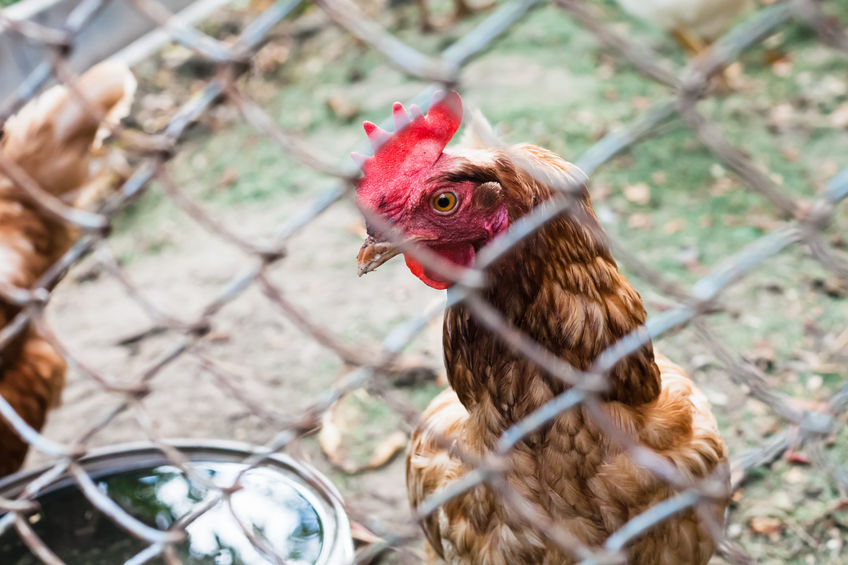
The World Organisation for Animal Health (OIE) says countries need to improve biosecurity in backyard flocks to counter the threat of diseases like avian influenza.
The OIE has conducted a survey of member countries looking at bio-security measures to battle animal diseases.
And it found that, whilst the vast majority of countries had suitable legislation and action plans to tackle disease, more action was needed to protect against the spread of disease from non-commercial holdings.
"Although implementation of bio-security plans occurs most frequently in commercial poultry and pig production systems in Europe, the survey highlighted the need to enhance bio-security in backyard and non-commercial farms, which can play a role in the spread of diseases," said the OIE in a report on the survey.
The survey was unveiled at a conference of the OIE Regional Commission for Europe, which was held in Tbilisi, Georgia in September.
The OIE said in its report, that the survey looked at the application of bio-security in different production systems at individual, country and regional levels.
"The findings show that the vast majority of responding countries have appropriate national legislations (94.87 per cent) and enforced action plans (92.31 per cent) with regard to bio-security," said the OIE.
"However, only half of the respondents indicated that their country had national funds to support the implementation of bio-security measures or good farming practices (53.85 per cent)."
Backyard flocks
The OIE also raised concern about bio-security in backyard flocks. The UK poultry industry has repeatedly raised its own concerns about the regulation of non-commercial poultry in recent years.
A total of 13 outbreaks of highly pathogenic H5N8 avian influenza hit the United Kingdom between December 2016 and June 2017 as the virus spread across large parts of Europe.
Six of those UK outbreaks were in backyard flocks comprising fewer than 200 birds in total, yet the effect on the commercial poultry sector was severe, particularly on exports.
Earlier this year, scientists at SRUC in Scotland mentioned backyard flocks in a report that highlighted flaws in bio-security.
The survey was conducted to look into disease control measures on small and medium size egg production units in Scotland.
The report, which was based on a survey commissioned by the Scottish Government, indicated that some 38 per cent of respondents did not consider themselves to be part of the Scottish poultry industry.
This, said the scientists, could be seen as a barrier to the uptake of best practice, health advice and disease control measures.
“These results reinforce just how important it is to promote engagement with backyard and small poultry keepers," said Carla Gomes, one of the scientists involved in the work.
"Better communication across the industry will increase the uptake of relevant information, such as awareness of disease control programmes and therefore reduce the risk of diseases being spread.”
Winter approaching
The OIE said in its report that, with the winter season now approaching, avian influenza was a concern that needed to be considered.
"Wild birds play a role as reservoirs and vectors of the virus, but other factors of transmission could be important unless appropriate bio-security measures are set in place," said the OIE.
"As an example of best practices, management of incoming and outgoing flows, procedures for cleaning and disinfection, protection measures against wild fauna and traceability requirements were described in the survey."
The report was not confined to AI, but the OIE said that all countries needed to be vigilant of animal diseases. "This was illustrated by the recent cases of African swine fever reported in several European countries.
Cases have also recently been reported in China with devastating consequences. The scenario is challenging and in the absence of an effective vaccine, implementing OIE-recommended bio-security measures in farms and at all country entry points is essential, in addition to other measures such as disease surveillance and early detection. Implementing bio-security requirements does not only involve veterinarians but also numerous stakeholders such as hunters, farmers and transporters."
It said: "The capacity of countries to implement bio-security measures in their territory is crucial. Investing in appropriate training and awareness raising of all stakeholders involved is a key responsibility of national authorities to change behaviours and improve the effectiveness of disease control programmes."
It said that the appropriate implementation of bio-security principles could prevent the transmission of pathogens to animals, humans and the environment.
Measures, such as good farming practices and control of animals and products movements, were crucial to prevent and contain outbreaks.
The poultry industry has repeatedly raised concerns about the disproportionate impact that outbreaks of AI in small backyard flocks can have on commercial producers.
